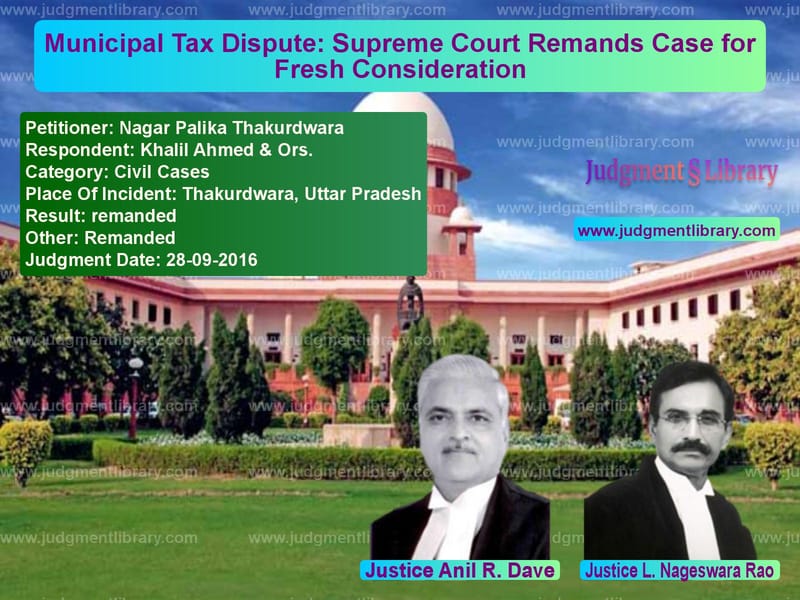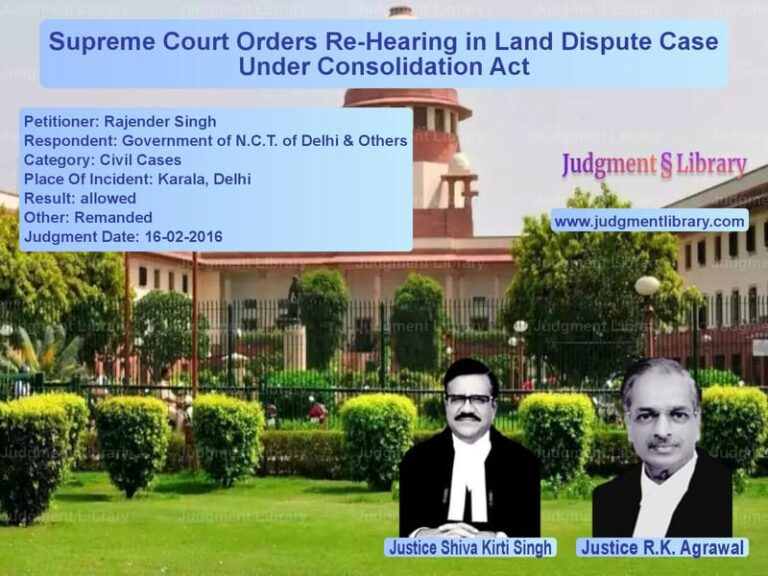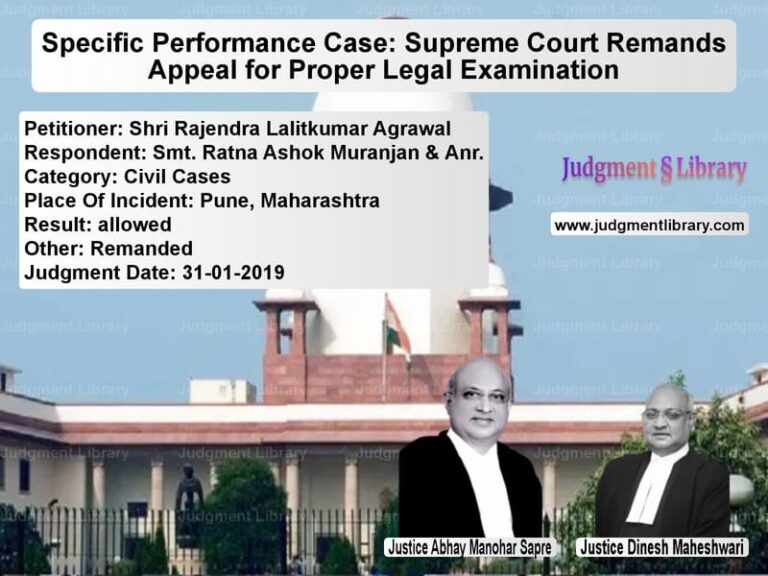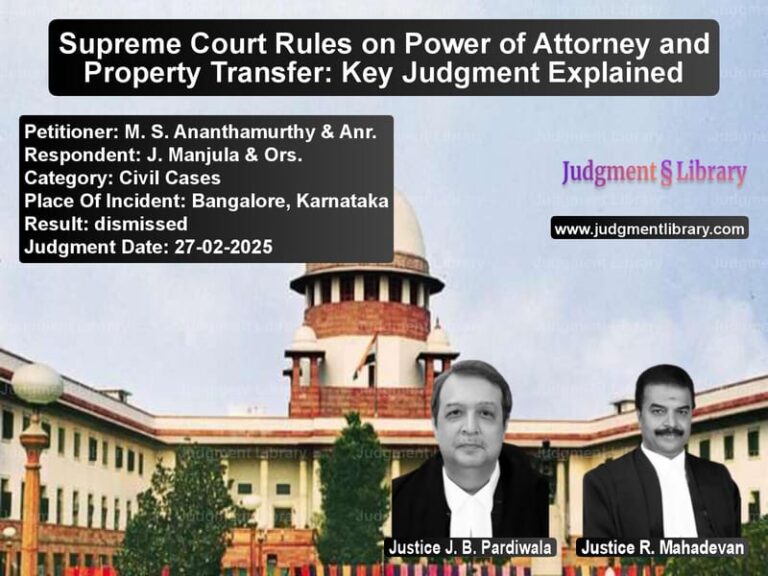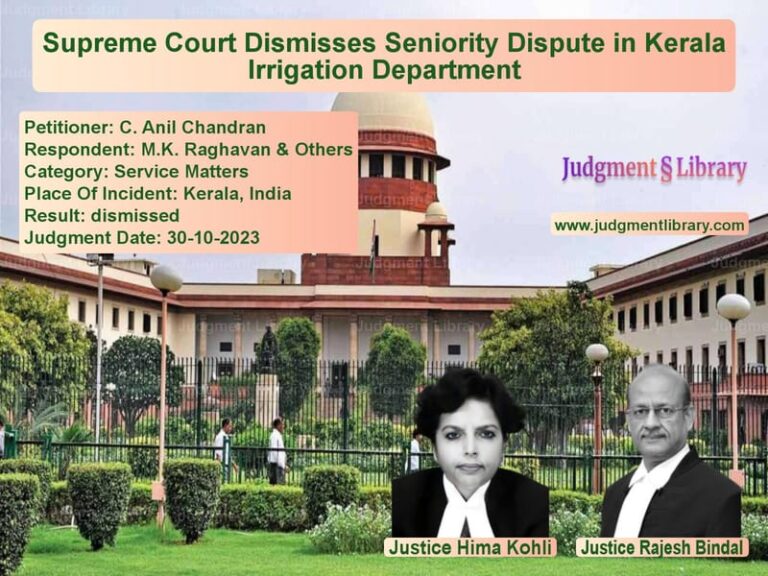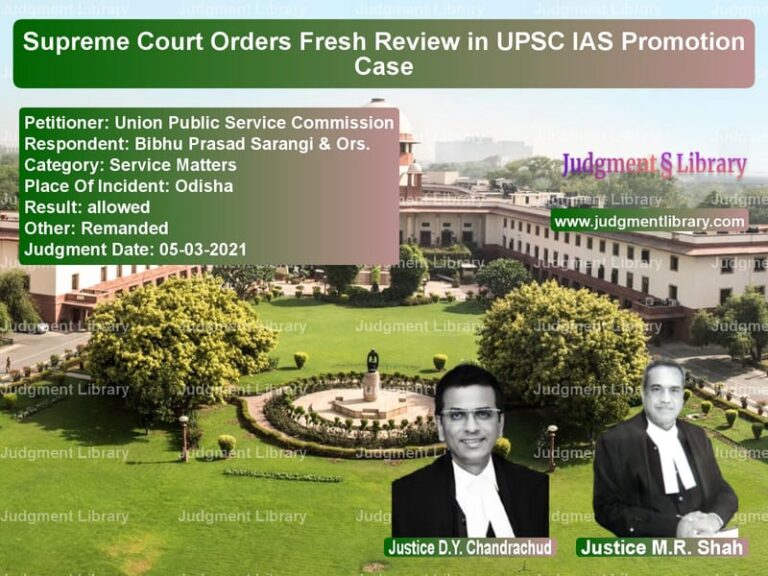Municipal Tax Dispute: Supreme Court Remands Case for Fresh Consideration
The case of Nagar Palika Thakurdwara v. Khalil Ahmed & Ors. revolves around a significant legal dispute concerning the imposition of municipal house tax in the town of Thakurdwara, Uttar Pradesh. The Supreme Court ruled that the High Court had incorrectly dismissed the second appeal and remanded the case for fresh consideration. This judgment clarifies the scope of municipal authority in taxation and reinforces legal principles regarding jurisdictional limits in tax imposition.
Background of the Case
The dispute began when the respondents, who were property owners outside the municipal limits of Nagar Palika Thakurdwara, filed a civil suit against the municipality. Their primary contention was that the Nagar Palika had no authority to levy house tax on their properties, as they were located beyond the municipal limits. They sought an injunction restraining the Nagar Palika from collecting tax and a declaration that they were not liable to pay municipal taxes under the Uttar Pradesh Municipalities Act, 1916.
Arguments of the Petitioners
The Nagar Palika Thakurdwara presented the following arguments:
- The properties were within the municipal limits and were, therefore, subject to house tax.
- The fact that respondent No. 1 had contested an election for the President of the Nagar Palika suggested his acknowledgment of the municipal jurisdiction.
- The respondents had no legal right to challenge the taxation under the Act, as the provisions of Sections 143 and 160 barred such challenges.
Arguments of the Respondents
The respondents countered with these arguments:
- The properties in question were outside the municipal limits and were not liable for house tax.
- The Nagar Palika was attempting to impose taxation without an official government notification extending municipal jurisdiction.
- They were entitled to relief from municipal tax demands until such notification was issued.
Legal Interpretation and High Court Ruling
The High Court dismissed the second appeal, citing Section 102 of the Code of Civil Procedure (CPC), which bars second appeals in cases where the amount involved is less than Rs. 25,000. As the tax demand in question was Rs. 11,006.07, the High Court refused to entertain the appeal.
Supreme Court’s Observations and Judgment
A bench comprising Justices Anil R. Dave and L. Nageswara Rao ruled that the High Court had misinterpreted Section 102 CPC. The Court noted that the suit was not just for the recovery of money but also involved declaratory relief and a permanent injunction challenging municipal taxation rights.
Key Observations
- The suit involved a crucial determination regarding municipal jurisdiction over the respondents’ properties.
- The High Court’s narrow interpretation of Section 102 CPC was incorrect, as the dispute involved legal rights beyond just monetary recovery.
- The legal maintainability of municipal tax in such cases needed thorough judicial scrutiny.
Excerpts from the Judgment
The Court ruled:
“In the instant case, the original suit was not only for recovery of money, but was also for a declaration and permanent injunction. In view of the aforestated fact, the provisions of Section 102 of the CPC could not have been applied.”
The Supreme Court remanded the case back to the High Court for fresh consideration, instructing it to decide the matter expeditiously.
Legal Implications
The judgment clarifies the following legal principles:
- Municipalities must establish their jurisdiction before imposing taxes.
- Section 102 CPC does not apply in cases where legal declarations and injunctions are sought.
- Courts must carefully evaluate the nature of taxation disputes rather than dismissing cases solely on monetary grounds.
Impact of the Judgment
This ruling has far-reaching consequences:
- It reinforces property owners’ rights to challenge taxation imposed without legal basis.
- It ensures that municipal bodies adhere to legal requirements before enforcing tax collection.
- It mandates judicial scrutiny of disputes regarding the extension of municipal limits.
Conclusion
The Supreme Court’s decision in Nagar Palika Thakurdwara v. Khalil Ahmed & Ors. upholds the principle of procedural fairness in municipal taxation. By remanding the case, the Court ensured that the taxation dispute would receive proper legal consideration, striking a balance between municipal authority and property owners’ rights.
Don’t miss out on the full details! Download the complete judgment in PDF format below and gain valuable insights instantly!
Download Judgment: Nagar Palika Thakurd vs Khalil Ahmed & Ors. Supreme Court of India Judgment Dated 28-09-2016-1741883882975.pdf
Direct Downlaod Judgment: Direct downlaod this Judgment
See all petitions in Property Disputes
See all petitions in Landlord-Tenant Disputes
See all petitions in Damages and Compensation
See all petitions in Judgment by Anil R. Dave
See all petitions in Judgment by L. Nageswara Rao
See all petitions in Remanded
See all petitions in Remanded
See all petitions in supreme court of India judgments September 2016
See all petitions in 2016 judgments
See all posts in Civil Cases Category
See all allowed petitions in Civil Cases Category
See all Dismissed petitions in Civil Cases Category
See all partially allowed petitions in Civil Cases Category

